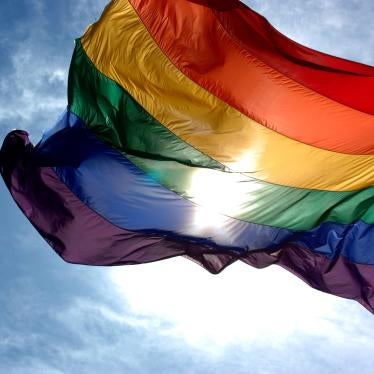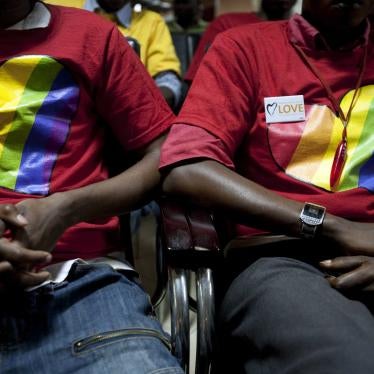Human Rights Watch submission to the Uganda Parliament Committee on Legal and Parliamentary Affairs on the Anti-Homosexuality Bill 2023
Human Rights Watch welcomes the opportunity to submit views on the Anti-Homosexuality Bill of 2023 to the Committee on Legal and Parliamentary Affairs. A list of recommendations to this committee follows at the end of our submission.
If the proposed Anti-Homosexuality Bill is adopted, it would violate multiple fundamental rights guaranteed under Uganda’s Constitution and international human rights instruments to which Uganda is a party, including the African Charter on Human and Peoples’ Rights and the International Covenant on Civil and Political Rights.
In this respect we recall the African Commission on Human and Peoples' Rights’ Resolution 275, 'Resolution on Protection against Violence and other Human Rights Violations against Persons on the basis of their real or imputed Sexual Orientation or Gender Identity’, which spells out the obligation on governments to prevent violence and other human rights violations against individuals on the basis of their sexual or gender identity. The bill would not only contravene that obligation, but pervert it by facilitating violence and rights violations.
The rights at stake include the rights to freedom of expression and association, liberty, privacy, equality, and freedom from discrimination and inhuman and degrading treatment.
Rights to freedom of expression, association, and liberty
Several provisions in the Anti-Homosexuality Bill contravene the rights to freedom of expression, of association, and to liberty as provided for in Uganda’s Constitution and under international law. These include the provisions that:
- Propose to criminalize any person who “holds out as a lesbian, gay, transgender, a queer, or any other sexual or gender identity that is contrary to the binary categories of male and female,” with a punishment of up to ten years in prison.
- Declare all same sex conduct as nonconsensual.
- Criminalize same sex marriage and make it an offence for a person to conduct a marriage ceremony between persons of the same sex.
- Forbid the so-called ‘promotion of homosexuality’ by individuals and civil society organizations through sweeping restrictions that would effectively prevent individuals from defending their rights.
- Criminalize any person who ‘aids, abets, counsels or procures another person to engage in acts of homosexuality’ which would effectively target anyone who offers support to lesbian, gay, bisexual, or transgender people, including friends, family members, civil society groups and other social support networks.
Right to Privacy
The Anti-Homosexuality Bill contravenes the right to privacy of person, home, and other property, which is guaranteed under Uganda’s Constitution, and international law by:
- Criminalizing consensual sex between adults, by creating the offence of homosexuality.
- Providing that where a person is charged with “aggravated homosexuality”, that person shall undergo a medical examination to ascertain his or her HIV status.
- Providing that a person who keeps a house, room, set of rooms or place of any kind for purposes of homosexuality commits an offence and is liable, to imprisonment.
- Criminalizing family or friends who offer support to lesbian, gay, bisexual, or transgender people.
Equality and Freedom from Discrimination, Inhuman and Degrading Treatment
The criminalization of consensual same-sex conduct contributes to a climate in which violence and discrimination against LGBT people is widespread. As the African Commission in Resolution 275 noted, every individual is entitled to respect of their life and the integrity of their person, and protection from torture and other cruel, inhuman, and degrading treatment or punishment. These rights are protected under Uganda’s constitution. As noted above, Uganda, as with other African governments have obligations to prevent violence and violations of rights against LGBT people, yet this bill would exacerbate the hostile environment that facilitates violence and violations.
Human Rights Watch research found that after the 2014 Anti-Homosexuality Act was passed, LGBTI people in Uganda faced reduced access to health services and HIV prevention information, faced discriminatory evictions by landlords, or were fired from their jobs on the basis of their perceived sexual orientation or gender identity.
The bill provides for discrimination against people on the basis of their sexual orientation by:
- Criminalizing consensual same sex conduct between adults, and by criminalizing sexual and gender identities “contrary to the binary categories of male and female.”
The bill also provides for discrimination against people with disabilities, contrary to Uganda’s Constitution, by:
- Making the offence of homosexuality aggravated if the “victim” has a disability, and thereby automatically denying persons with disabilities the capacity to consent to sex.
The bill also discriminates against people with HIV, and effectively criminalizes living with HIV:
- In making the offence of homosexuality aggravated where the offender is a person living with HIV.
The Right to a Fair Hearing
Several provisions in the Anti-Homosexuality Bill provide for broad interpretations that violate accused person’s rights to fair hearing, contrary to Uganda’s Constitution which requires criminal offences to be clearly defined.
These provisions include:
- Broad prohibitions on acts such as touching another person “with the intention of committing the act of homosexuality.”
- Criminalizing a person who “promotes homosexuality” including a person who “funds or sponsors homosexuality or other related activities.”
Recommendations to the Committee
In light of the above, Human Rights Watch makes the following recommendations to the Committee and to the Parliament of Uganda:
- Scrap the Anti-Homosexuality Bill 2023.
- Propose the repeal of Penal Code provisions that criminalize adult consensual same sex conduct.
- Propose measures, including comprehensive non-discrimination legislation, that would protect sexual and other minorities








